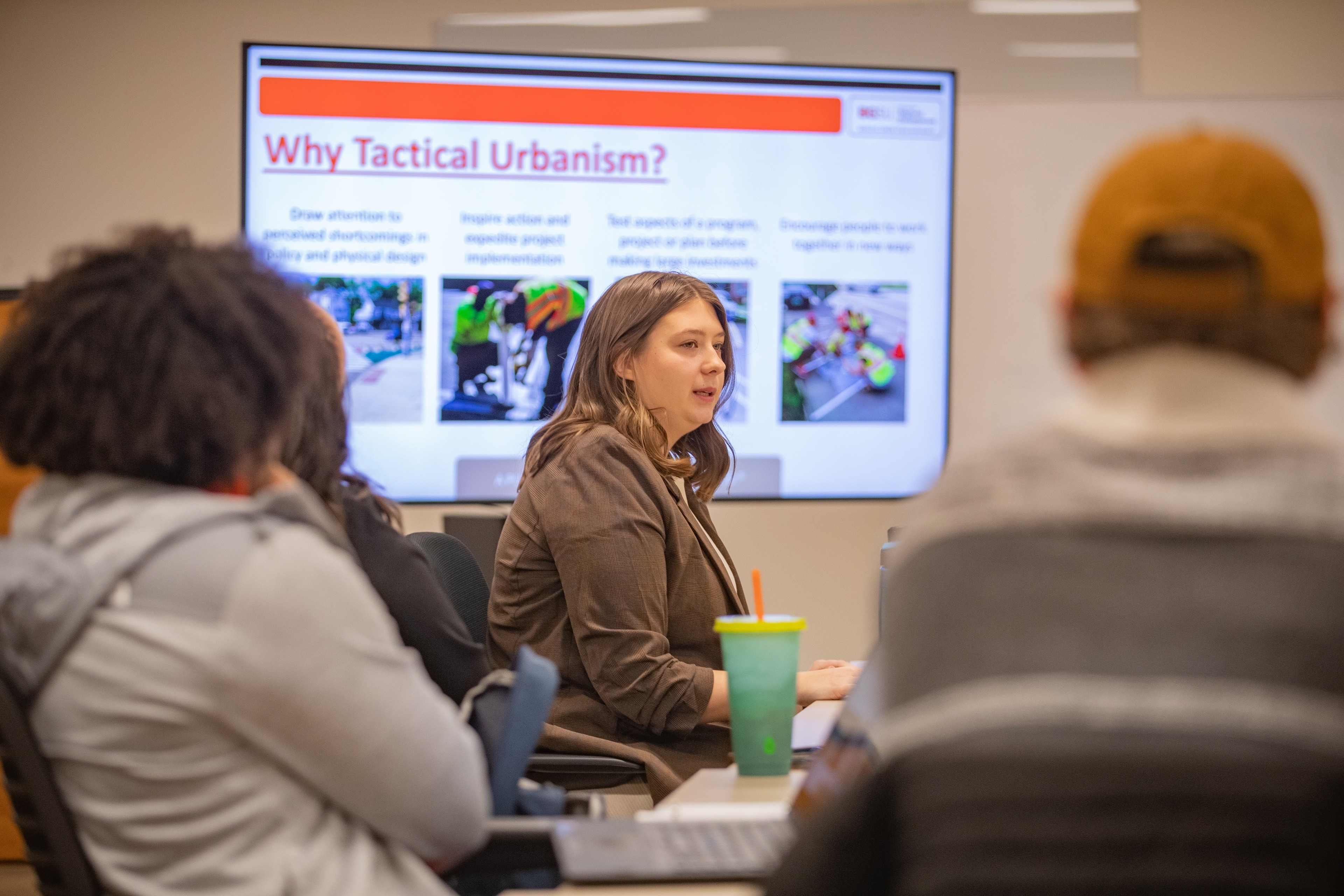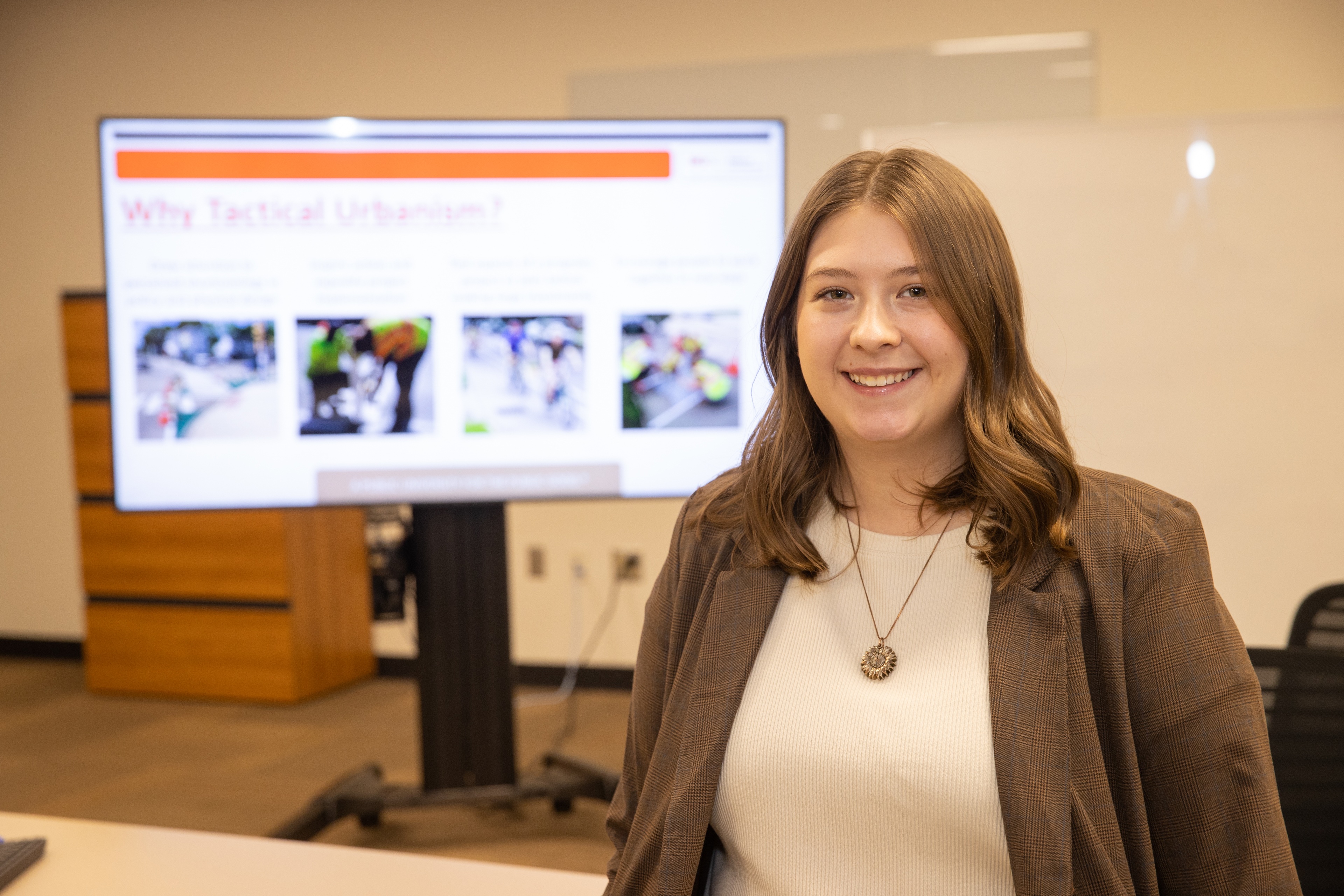
BGSU program dedicated to revitalizing Ohio rural communities is reshaping students’ educational experiences, enhancing regional economic vitality
The University’s Reimagining Rural Regions (R3) program is now in its second cohort of communities, involving Bowling Green, Mansfield and Paulding
By Laren Kowalczyk '07
Growing up, Kylie Stanley couldn’t wait to get out of her small hometown of Sidney, Ohio. She planned to get a college degree and move to a big city.
Then, midway through her Master of Public Administration degree at Bowling Green State University and internship with the University’s Reimagining Rural Regions (R3) program, something changed.
“I think a lot of people from small towns have dreams similar to mine,” said Stanley, a first-generation college student following the accelerated bachelor's to master's degree path. “They can’t wait to leave small-town life behind. I was the same way until I got involved in the R3 program at BGSU and saw the difference we can make in small towns.
“Moving back home is something I wouldn’t have considered even a few years ago, and now that’s my dream.”
The R3 program, developed by the BGSU Division of Research and Economic Engagement and the Center for Regional Development (CRD), drives economic vitality by filling a void in the public engagement and planning phases of economic development in rural communities across Ohio.
The program serves as an unbiased resource to help communities ensure they dedicate time and money toward development opportunities the community supports and ones that will aid in talent attraction and retention.
BGSU graduate and undergraduate students, through internships and graduate assistantships, immerse themselves in the cohort communities to conduct interviews, focus groups and viability studies.
Spearheading public engagement
The R3 program is an economic and workforce development-centered placemaking initiative funded through a grant from the U.S. Economic Development Administration (EDA) and a cooperative agreement through the U.S. Department of Agriculture Rural Placemaking Innovation Challenge.
The goal of the program is to gain broad and diverse public engagement within a community and give leaders the necessary information to make the best decisions for their communities. This provides leaders with specific and direct input from their community members.
The program launched in 2021 and is provided at no cost to the communities, which are chosen through a competitive application process.
The first cohort of communities included Gibsonburg, Van Wert and Marysville.
Work in those communities involved reimagining green space in downtown Gibsonburg, developing a multi-purpose space in downtown Van Wert and creating a year-round event schedule at the Union County fairgrounds in Marysville.
Although the students’ work in those communities wrapped up at the end of the summer, the CRD can still serve as a resource as the projects progress by assisting communities with finding grant funding or connecting them with consultants or other organizations.
Second cohort of communities
The program’s second cohort – Bowling Green, the county seat of Wood County; Mansfield, midway between Columbus and Cleveland; and the village of Paulding, in northwest Ohio – was announced in June 2022 and is in the first phase of public engagement.
CRD graduate assistants are meeting with steering committees composed of community volunteers and setting up focus groups to get a pulse from residents on the kinds of projects that could best serve their communities.
Based on the information gathered, the students will focus on the community’s top choices.
They’ll conduct additional public outreach in the summer with help from the University’s undergraduate Placemaking and Community Engagement (PaCE) Fellows, who spend the spring semester learning how to engage communities in placemaking initiatives.
“We’re not going in and saying you should do this project based on the research we conducted,” said Maddi Georgoff-Menich ‘15, ‘21, CRD community placemaking program coordinator. “We’re facilitating a community engagement process to understand what the community wants and providing a voice for people who haven’t been listened to before. Then, we help the community construct a strategic plan to get there.
“These small towns are doing great things, but they often don’t have the capacity to go out and do hours and hours of community engagement, which we’re able to provide,” Georgoff-Menich said.

‘Power in economic development’
Stanley can attest to that from her experience in Mansfield. In her second year with the R3 program, now as a graduate assistant, Stanley is meeting with the city’s steering committee, conducting focus groups and interviewing business and property owners.
Stanley said most of the people on the steering committee have full-time jobs and numerous other responsibilities, yet are very committed to the revitalization project.
“I think people have perceptions of older folks in rural towns not wanting change,” Stanley said. “That has not been my experience. They are very excited that we’re here. Everyone I’ve worked with has been so thankful that this work is getting done.”
The city of Mansfield is planning to continue its Mansfield Rising initiative by reimaging a parking lot in the heart of downtown into a community asset and gathering place.
For Stanley, the R3 program at BGSU has provided invaluable experience that she expects will put her at an advantage for future career opportunities.
“Without this program, I would not be on such an upward trajectory for my career,” she said. “It really has strengthened my resume and networking skills. I am confident in the skills I developed through the R3 program, and as a result, I feel incredibly qualified to enter the workforce.
“There’s real power in economic development, and I think it can create change in rural communities. I want to be a part of that change.”
Related Stories
Media Contact | Michael Bratton | mbratto@bgsu.edu | 419-372-6349
Updated: 01/30/2023 03:52PM




